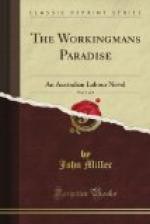He did not think that he was much the same as others, more forceful perhaps for evil as for good but still much the same. He did not think that social conditions had been against him, that Society had refused him the natural life which gives morality and forced upon him the unnatural life which fosters sin. What did that matter? The Puritan blood that flowed in his veins made him stern jury and harsh judge. He tried himself by his own ideal and he condemned himself. He was unworthy. He had condemned those who drank; he had condemned those who cursed and swore meaninglessly; he had looked upon smoking as a weakness, almost a fault. Now, he condemned himself, without reservation. He had sinned and his punishment had begun. He had lived in vain and he had lost his love. It never occurred to him that he might play a part before her—he was too manly. Yet his great longing grew greater as he realised everything. All the loneliness of his longing spoke in that hoarse whisper:
“Nellie?”
And Nellie? Nellie loved him.
She had held him as a brother for so long that this love for him had crept upon her, little by little, inch by inch, insidiously, unperceived. She remembered always with pleasure their school days together and their meetings since, that meeting here in Sydney two years before most of all. She had felt proud of him, of his strength and his fiery temper, of his determined will, of the strong mind which she could feel growing and broadening in the letters he had sent her of late. She could not but know that to him she was very much, that to her he owed largely the bent of his thinking, that to her he still looked as a monitress. But she lulled herself with the delusion that all this was brotherliness and that all her feelings were sisterliness. His coming that night, his gift of the rose, had filled her with a happiness that mingled strangely with the pain of her fears.




